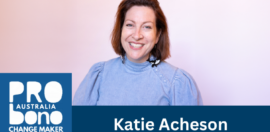NFP And Individuals Have Roles In The Future Of Social Change
11 July 2012 at 11:37 am
Only 20 per cent of adults, on average, say they’re more likely to donate money to a cause or an organisation when economic conditions are bad, according to new US report.
Results from Walden University’s 2012 Social Change Impact Report show that two-thirds of adults across the globe (65 per cent, on average) agree that when economic conditions are bad, it is more important to be involved in social change than when economic conditions are good.
However, the study found that only 20 per cent of adults say they’re more likely to donate money to a cause or an organisation when economic conditions are bad.
This is one of findings in the 2012 Social Change Impact Report about the current state of social change around the world.
Commissioned by Walden University and conducted online by Harris Interactive in February–March 2012, the second annual survey includes perspectives of more than 8,900 adults in Brazil, Canada, China, Germany, India, Jordan, Mexico and the U.S., and gauges their perceptions and motivations for getting involved, as well as the roles of Not for Profit organisations, government and the media in social change across countries.
“Our initial survey last year underscored the undeniable power of social change in action from individuals and organisations who worked together to improve the world around them,” Dr. Cynthia Baum, President of Walden University said.
“The 2012 survey’s findings emphasize how factors such as the state of the economy can influence social change attitudes and behaviors, especially at a time when the need is so great. As social movements continue to ignite people’s passions and fuel communities around the world, it will be important to continue to assess the impact at the level of the individual.”
According to the 2012 Social Change Impact Report, adults in the U.S., Canada and Germany indicated that they are least likely to change their actions as a result of bad economic conditions, while those in Jordan and India are most likely to shift their behaviors under these conditions.
While donating money, goods or services is the top way adults have become involved in social change in the past six months (50 per cent on average), donating money is also where adults are most likely to cut back when economic conditions are bad (37 per cent on average).
Instead, adults are more likely to increase their participation in volunteer work or service (29 per cent on average) and in using social networking sites (28 per cent on average) to engage in social change.
The survey also found that Not for Profit organisations and individuals both have important roles in the future of social change. In seven of the eight countries surveyed, NFPs are among the top two ways adults are most likely to get involved in social change. Jordan is the exception, where becoming involved as an individual or through a religious institution ranks higher.
Despite the fact that many adults around the world see the value in Not for Profits and that a majority get involved through organisations, institutions or companies (60 per cent on average), a majority still believe the most important agents of social change are “individual people acting on their own, not organisations or companies” (59 per cent on average agree ). Adults in Canada (27 per cent), India (23 per cent), the U.S. (22 per cent) and Jordan (19 per cent) are most likely to get involved as individuals.
In addition, adults most commonly believe that NFPs “make it easy for people to get involved” (48 per cent on average) but also that “too much of their budgets goes to overhead costs while not enough goes to providing services or making change happen” (36 per cent on average).
Click here for more detailed findings from Walden’s Social Change Impact Report.







